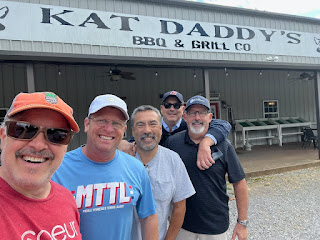Just thought I'd share some of the words I've been collecting over the last few years. When I have to look up a definition, or if I especially like the sound of a word, I'll jot them down in one of several journals I have desk-side here at FatScribe South (
San Diego). The one thing I absolutely
adore and am so thankful to God for, is that both my kids love words (and concepts) and can deconstruct a sentence or a film, a photo or a book and really find the subtext, the
sub rosa meanings in chosen words, images, layers, and even the sequence of scenes or placement of objects as shared by a director, author, or photographer with us, their audience. There's nothing like a smart creative paying homage to us, their muse, n'est pas? Especially when we "get it." And a double especially when our progeny and brood pick up on these little hidden Easter eggs and meanings and double entendres within a piece, written or otherwise.
Quick note: for my take on
books, have a read here:
Eleven in '11 ... No. 2 (books)
I stumbled upon a favorite "talky" film from 1987 that I thoroughly enjoyed when it was first released, and that I purchased on YouTube (Google) several years ago to show my sons.
84 Charing Cross Road is a film with lots of books, fountain pens, and great actors, viz., Anne Bancroft, Anthony Hopkins, Judy Dench and Mercedes Ruehl. The film is based upon Helene Hanff's life and her epistolary relationship with Mr. FPD (see photo,
infra) of Marks and Co. There are no explosions. No CGI. No sexy-sexy time with shades of gray or gory-gory time with pools of red. Just -- as our 44th president said in an infamous speech -- "words, just words." I love those words. The Bible says, "In the beginning was the Word ..." and I've always appreciated that construct of channeling revelation to man via those words. I cherish them, and have tried to transfer that love to my Creole/Cajun boys and they do, cherish them that is. Thank you, Lord, for that.
I call the particular journal that I use to track words in "Heuristica," and it's where I work out little problems, ideas, meanings of certain turns of phrase, as well as these words that follow for your enjoyment if you're a fellow wordsmith, sesquipedalian or lover of all things related to the word.
 |
| 84 Charing Cross Road, an Anglophile's dream |
For example, try some of these on for size:
- Fecundity -- An ability to produce large amount of offspring; fertile
- Panglossian -- Overly optimistic
- Concomitant -- Naturally accompanying
- Factotum -- A handyman, assistant
- Depredation -- Plunder
- Mendacious -- Lying
- Sidle -- Walk up to in an unobtrusive manner
- Provenance -- Authenticate authorship
- Burnish -- to polish up
If you're like me,
Dear Reader, you're constantly placing marginalia throughout your own personal library. My kids know I've read many of my books "
ex libris Jg." because when they open them, they notice my chicken scratch is filled throughout these tomes in the form of so many exclamation marks for really good points, or where I offer my own
better points or word choices (he said humbly), or simply tangential thoughts with references to other works by other writers to complement and compliment (words ... love 'em).
Then there are these other words to consider that are found within the velvet cover of
The Heuristica of FatScribe over the last few years:
- Hoary -- Old, trite or washed-out
- Patois -- Vernacular of a people (creole)
- Twee -- Overly sentimental; sweet, sappy, saccharine
- Erstwhile -- Former (in the past)
- Enervate -- To cause to lose power; drained
- Sublimate -- Divert or modify to become more acceptable
- Arriviste -- Ruthlessly self-seeking, ambitious person
- Internecine -- Destructive to both sides in a rivalry
- Recondite -- Abstruse, little known
- Preening -- Clean one's feathers; upright; straight
- Wabi-sabi -- Japanese seeing beauty in patina of imperfection
- Sturm & Drang -- Storm & stress; drama
I won't go into too much more detail here, just wanted to share with you all some of the words found on about 30 or so pages in this 200 page journal. I'm sure we'll fill it up someday, maybe not soon, but soon enough. As always, thanks for the visit.




















